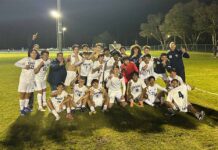Kevin Grogan,
Gear for Multisport
After Hurricane Michael hammered the Gulf Coast, the 20th edition of the Ironman Florida Triathlon was relocated. What was scheduled in Panama City Beach was quickly shifted by a day to Haines City, Florida; which is about 25 miles of south Lake County. This would be the closest official full Ironman ever produced near south Lake.
Two local triathletes signed up long ago for their first Iron distance race when it was scheduled for the first venue and had to shift their race plans to this new backup venue. As if the 140+ mile grueling event wasn’t enough to worry about, Jeff Stephens, a local professor at the Lake-Sumter State College and Daniel Whitehouse, a lawyer for the firm Whitehouse & Cooper, revised their plans to complete their first Ironman race.
Each of them conquered the race and proved Anything is Possible!
What is your triathlon background before the Ironman?

Stephens: After being sedentary for the better part of 20 years, this started as a dare over margaritas in April 2016, leading to a disastrous sprint distance, I told my wife I was going to do an Ironman by age 50. Her response: No way it happens….Game on!

Whitehouse: I completed my first super sprint triathlon on January 1, 2016, at a training event in Clermont. I have steadily been increasing the distances ever since.
What was your biggest challenge leading up to Ironman race?
Stephens: Time for training and fighting the burnout. Balancing life responsibilities around the training schedule.
Whitehouse: Managing the grueling training schedule on top of life (including family and work).
And how about on race day?
Stephens: Grinding out the miles. And miles. And miles.
Whitehouse: I received a number of curveballs on race day that I wasn’t expecting. I finished the swim burning more energy than expected, which led to feeling nearly exhausted around mile 60 on the bike. I managed to regain some strength leading into the run until around mile 5 when my stomach felt like I swallowed a basketball.
How difficult mentally was the venue change from Panama City to the closer Haines City?
Stephens: After a day or two, I was excited about the change. It allowed for more support locally, and I was able to make all the training commitment pay off, so I was on board rather quickly. I had just done the half in April in Haines City, so I was a little familiar with the course as well.
Whitehouse: It was more of a relief for me than a difficulty. I knew there would be hills on the new course-and that I didn’t train for hills-but I also knew I would have the opportunity to start the race and see where six months of training could lead me. The thought of training for six months with no race to test my abilities was worse than being undertrained for the new course.
Will you race another 140.6 race?
Stephens: Signed up for Chattanooga in 2019. After that, all bets are off.
Whitehouse: That’s a loaded question. I, unfortunately, missed my goal (due to the basketball-feeling in my stomach), and I don’t like leaving matters unsettled. Having said that, I need a break from 15- to 20-hour training weeks.
What made you want to do this event?
Stephens: My friend and I were to do Miami Man half in November, but he backed out. I was looking to do one more end of season race and had just done the half in April, so I pulled the trigger. I felt nauseous as soon as the payment posted.
Whitehouse: I selected this race because the run in Panama City Beach is a flat run. Little did I know we would end up with one of the most challenging run courses in Ironman history.
Is the Ironman just a race or do you think it is something more?
Stephens: It’s truly a life-changing commitment. I don’t look at it as a race, as I am not a competitor, but as more of an event. Everyone is so accommodating and supportive, it is a true community of athletes. And it is definitely something of which I am proud.
Whitehouse: In a few short years of competing in triathlons, I have raced with many different event companies. I have not seen anything that compares to the Ironman race experience. The level of professionalism by the staff and the eagerness of the volunteers to make your race day memorable are second to none.
Describe the conditions in your own opinion.
Stephens: The weather was good for the most part, with clouds keeping the temperature down during the bike. There was a little sun at the beginning of the run, and that increased the heat, but then an hour-long downpour dampened the late stages of the run. The roads were decent, and the support staff was excellent, with well-stocked aid stations and very helpful staff. The swim was a slugfest with all the turns and the mass of participants, but considering the short timed change of venue, this race was exceptionally done.
Whitehouse: The morning was slightly overcast with a few sprinkles drizzling with less than thirty minutes to race start. They dissipated as the sun rose over Lake Eva. The conditions on the bike changed from overcast to clear, which eventually made way for afternoon heat. The heat settled in just as I was beginning the run, which lasted for the first two hours of the run. The overcast skies appeared again as the sun began to set, which made way for the transition to darkness. I was fortunate to finish just minutes before the sky let loose a massive downfall, which was still coming down as I arrived at my hotel an hour or two later. All in all, it was an incredibly memorable experience and I cannot say enough good things about all those who contributed to making the event possible.
And finally, what do you take away from the Ironman experience?
Stephens: The Ironman mantra: “Anything is possible” is true. If I can do it, I am certain anyone can. But time is the obstacle.
Whitehouse: More than I have been able to process at this point. I sincerely commend the people of Haines City, who welcomed this race into their backyards with open arms and supported it to no end. Volunteers came from far and wide to help make this Ironman a success, and their efforts meant the world to the competitors.
 Kevin Grogan is a contributing writer for the South Lake Tablet. He is also the owner of Gear for Multisport, Athletic Gear and a south Lake athlete.
Kevin Grogan is a contributing writer for the South Lake Tablet. He is also the owner of Gear for Multisport, Athletic Gear and a south Lake athlete.












